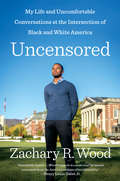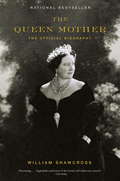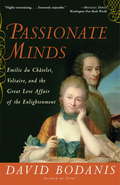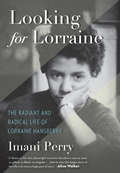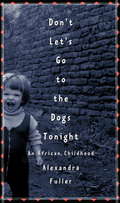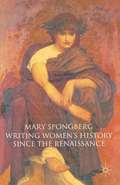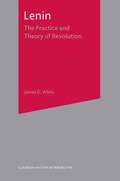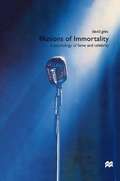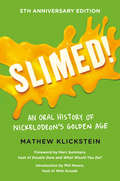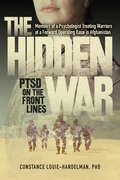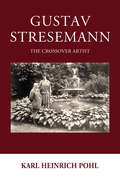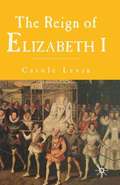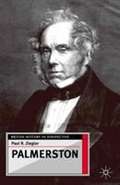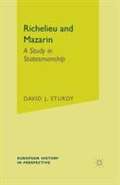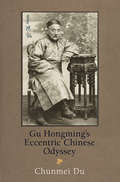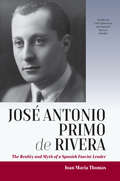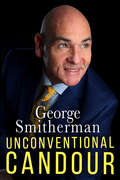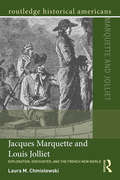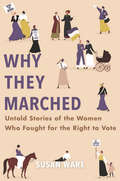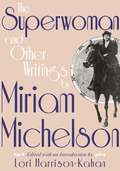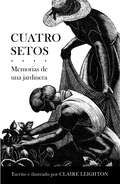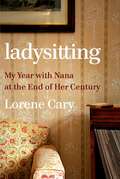- Table View
- List View
Uncensored: My Life and Uncomfortable Conversations at the Intersection of Black and White America
by Zachary R. WoodRooted in his own powerful personal story, twenty-one-year-old Zachary Wood shares his dynamic perspective on free speech, race, and dissenting opinions--in a world that sorely needs to learn to listen.As the president of the student group Uncomfortable Learning at Williams College, Zachary Wood knows all about intellectual controversy. From John Derbyshire to Charles Murray, there's no one Zach refuses to debate or engage with simply because he disagrees with their beliefs--sometimes vehemently so--and this controversial view has given him a unique platform on college campuses and in the media.But Zach has never shared the details of his own personal story, and how he came to be a crusader for open dialogue and free speech. In Uncensored, he reveals for the first time how he grew up poor and black in Washington, DC, in an environment where the only way to survive was to resist the urge to write people off because of their backgrounds and their perspectives. By sharing his troubled upbringing--from a difficult early childhood filled with pain, uncertainty, and conflict to the struggles of code-switching between his home in a rough neighborhood and his elite private school--Zach makes a compelling argument for a new way of interacting with others, in a nation and a world that has never felt more polarized. In Uncensored, he hopes to foster a new outlook on society's most difficult conversations, both on campus and beyond.
The Queen Mother: The Official Biography
by William ShawcrossThe official and definitive biography of Queen Elizabeth the Queen Mother: consort of King George VI, mother of Queen Elizabeth II, grandmother of Prince Charles, and the most beloved British monarch of the twentieth century. Elizabeth Angela Marguerite Bowes-Lyon--the ninth of the Earl of Strathmore's ten children--was born on August 4, 1900, and, certainly, no one could have imagined that her long life (she died in 2002) would come to reflect a changing nation over the course of an entire century. Vividly detailed, written with unrestricted access to her personal papers, letters, and diaries, this candid royal biography by William Shawcross is also a singular history of Britain in the twentieth century.From the Trade Paperback edition.the dowager Queen--the last Edwardian, the charming survivor of a long-lost era--representing her nation at home and abroad . . . the matriarch of the Royal Family and "the nation's best-loved grandmother."A revelatory royal biography that is, as well, a singular history of Britain in the twentieth century.From the Hardcover edition.
Passionate Minds: The Great Enlightenment Love Affair
by David BodanisEmilie du Chatelet was one of the greatest thinkers of the 18th century, a woman whose work was of vital use to Einstein and who, until now, has been largely ignored by history. Fiercely intellectual and passionate, Emilie's relationship with Voltaire was as radical as her thinking; only after swordfights, wild affairs and rigging the French national lottery did the two finally find love together. In an isolated chateau they combined their unique talents, producing theories more than a century ahead of their time. Voltaire challenged the social norms and great injustices of the era, as well as expanding on Newton's Laws. When they ran out of money, Emilie, with her razor-sharp mathematics, would gamble in Versailles. Their progressive thinking won them only public scorn and even imprisonment in the Bastille for Voltaire. When their love finally ended, Emilie found happiness in an independent life until, tragically, she became pregnant. Then in her forties, it meant an almost-certain death in childbirth.
Looking for Lorraine: The Radiant and Radical Life of Lorraine Hansberry
by Imani PerryA revealing portrait of one of the most gifted and charismatic, yet least understood, Black artists and intellectuals of the twentieth century. <p><p> Lorraine Hansberry, who died at thirty-four, was by all accounts a force of nature. Although best-known for her work A Raisin in the Sun, her short life was full of extraordinary experiences and achievements, and she had an unflinching commitment to social justice, which brought her under FBI surveillance when she was barely in her twenties. While her close friends and contemporaries, like James Baldwin and Nina Simone, have been rightly celebrated, her story has been diminished and relegated to one work—until now. <p> In 2018, Hansberry will get the recognition she deserves with the PBS American Masters documentary “Lorraine Hansberry: Sighted Eyes/Feeling Heart” and Imani Perry’s multi-dimensional, illuminating biography, Looking for Lorraine. <p> After the success of A Raisin in the Sun, Hansberry used her prominence in myriad ways: challenging President Kennedy and his brother to take bolder stances on Civil Rights, supporting African anti-colonial leaders, and confronting the romantic racism of the Beat poets and Village hipsters. Though she married a man, she identified as lesbian and, risking censure and the prospect of being outed, joined one of the nation’s first lesbian organizations. Hansberry associated with many activists, writers, and musicians, including Malcolm X, Langston Hughes, Duke Ellington, Paul Robeson, W.E.B. Du Bois, among others. <p> Looking for Lorraine is a powerful insight into Hansberry’s extraordinary life—a life that was tragically cut far too short.
Don't Let's Go to the Dogs Tonight: An African Childhood (Picador Classic Ser. #11)
by Alexandra FullerNEW YORK TIMES BESTSELLER * ENTERTAINMENT WEEKLY'S #1 NONFICTION BOOK OF THE YEAR * A NEW YORK TIMES NOTABLE BOOK * FINALIST, GUARDIAN FIRST BOOK PRIZE "This is not a book you read just once, but a tale of terrible beauty to get lost in over and over."--Newsweek "By turns mischievous and openhearted, earthy and soaring . . . hair-raising, horrific, and thrilling."--The New Yorker In Don't Let's Go to the Dogs Tonight, Alexandra Fuller remembers her African childhood with visceral authenticity. Though it is a diary of an unruly life in an often inhospitable place, it is suffused with Fuller's endearing ability to find laughter, even when there is little to celebrate. Fuller's debut is unsentimental and unflinching but always captivating. In wry and sometimes hilarious prose, she stares down disaster and looks back with rage and love at the life of an extraordinary family in an extraordinary time. From 1972 to 1990, Alexandra Fuller--known to friends and family as Bobo--grew up on several farms in southern and central Africa. Her father joined up on the side of the white government in the Rhodesian civil war, and was often away fighting against the powerful black guerilla factions. Her mother, in turn, flung herself at their African life and its rugged farm work with the same passion and maniacal energy she brought to everything else. Though she loved her children, she was no hand-holder and had little tolerance for neediness. She nurtured her daughters in other ways: She taught them, by example, to be resilient and self-sufficient, to have strong wills and strong opinions, and to embrace life wholeheartedly, despite and because of difficult circumstances. And she instilled in Bobo, particularly, a love of reading and of storytelling that proved to be her salvation. A worthy heir to Isak Dinesen and Beryl Markham, Alexandra Fuller writes poignantly about a girl becoming a woman and a writer against a backdrop of unrest, not just in her country but in her home. But Don't Let's Go to the Dogs Tonight is more than a survivor's story. It is the story of one woman's unbreakable bond with a continent and the people who inhabit it, a portrait lovingly realized and deeply felt.Praise for Don't Let's Go to the Dogs Tonight "The Africa of this beautiful book is not easy to forget. Despite, or maybe even because of, the snakes, the leopards, the malaria and the sheer craziness of its human inhabitants, often violent but pulsing with life, it seems like a fine place to grow up, at least if you are as strong, passionate, sharp and gifted as Alexandra Fuller."--Chicago Tribune "Owning a great story doesn't guarantee being able to tell it well. That's the individual mystery of talent, a gift with which Alexandra Fuller is richly blessed, and with which she illuminates her extraordinary memoir. . . . There's flavor, aroma, humor, patience . . . and pinpoint observational acuity."--Entertainment Weekly "This is a joyously telling memoir that evokes Mary Karr's The Liars' Club as much as it does Isak Dinesen's Out of Africa."--New York Daily News "Riveting . . . [full of] humor and compassion."--O: The Oprah Magazine "The incredible story of an incredible childhood."--The Providence JournalFrom the Hardcover edition.
Writing Women’s History since the Renaissance
by Mary SpongbergThe complaint of Catherine Morland in Jane Austen's Northanger Abbey, that history has 'hardly any women at all' is not an uncommon one. Yet there is evidence to suggest that women have engaged in historical writing since ancient times. This study traces the history of women's historical writing, reclaiming the lives of individual women historians, recovering women's historical writings from the past and focusing on how gender has shaped the genre of history. Mary Spongberg brings together for the first time an extensive survey of the progress of women's historical writing from the Renaissance to the present, demonstrating the continuities between women's historical writings in the past and the development of a distinctly woman-centred historiography. Writing Women's History since the Renaissance also examines the relationship between women's history and the development of feminist consciousness, suggesting that the study of history has alerted women to their unequal status and enabled them to use history to achieve women's rights. Whether feminist or anti-feminist, women who have had their historical writings published have served as role models for women seeking a voice in the public sphere and have been instrumental in encouraging the growth of a feminist discourse.
Lenin: The Practice and Theory of Revolution (European History In Perspective Ser.)
by James D. WhiteA political and intellectual biographical study of Lenin which focuses on those aspects of his thought and political activities that had a bearing on the accession of the Bolsheviks to power in Russia in 1917 and the creation of the Soviet state. The book places Lenin in the context of his times and shows his relationship to other socialist thinkers. In particular it locates Lenin within the development of Marxist thought in Russia. Its historiographical chapter reveals the political factors which influenced the way biographies of Lenin were written in the Soviet Union. The book makes extensive use of first-hand materials including sources from the Russian archives.
Illusions of Immortality: A Psychology Of Fame And Celebrity
by David GilesWhat drives people to crave fame and celebrity? How does fame affect people psychologically? These issues are frequently discussed by the media but up till now psychologists have shied away from an academic away from an academic investigation of the phenomenon of fame. In this lively, eclectic book David Giles examines fame and celebrity from a variety of perspectives. He argues that fame should be seen as a process rather than a state of being, and that `celebrity' has largely emerged through the technological developments of the last 150 years. Part of our problem in dealing with celebrities, and the problem celebrities have dealing with the public, is that the social conditions produced by the explosion in mass communications have irrevocably altered the way we live. However we know little about many of the phenomena these conditions have produced - such as the `parasocial interaction' between television viewers and media characters, and the quasi-religious activity of `fans'. Perhaps the biggest single dilemma for celebrities is the fact that the vehicle that creates fame for them - the media - is also their tormentor. To address these questions, David Giles draws on research from psychology, sociology, media and communications studies, history and anthropology - as well as his own experiences as a music journalist in the 1980s. He argues that the history of fame is inextricably linked to the emergence of the individual self as a central theme of Western culture, and considers how the desire for authenticity, as well as individual privacy, have created anxieties for celebrities which are best understood in their historical and cultural context.
Slimed!: An Oral History of Nickelodeon's Golden Age
by Mathew KlicksteinSLIMED! An Oral History of Nickelodeon's Golden Age tells the surprisingly complex, wonderfully nostalgic, and impressively compelling story of how Nickelodeon -- the First Kids' Network -- began as a DIY startup in the late 70s, and forged ahead through the early eighties with a tiny band of young artists and filmmakers who would go on to change everything about cable television, television in general, animation, and children's entertainment, proving just what can be done if the indie spirit is kept alive in the corporate world. Get the real back story about all of your favorite Golden Age Nick shows: Everything from such classics as You Can't Do That On Television, Out of Control and Double Dare to early 90s faves like The Adventures of Pete & Pete, the original three Nicktoons, Clarissa Explains It All and more ... All from those who made it happen!
The Hidden War: PTSD on the Front Lines
by Constance Louie-HandelmanDriven by her passionate desire to serve, psychologist Connie Louie-Handelman joined the US Army at the age of 56. Disturbed by the high rates of PTSD and suicide among warriors, she wanted to make a difference. After training, she was deployed at a forward operating base in the hot and dusty plains of Kandahar, Afghanistan. There she found soldiers fighting more than the enemies they encountered in the battlefield. The casualty rate from invisible enemies like anxiety, depression, low self-esteem, and fear was high. When improvised explosive devices killed or wounded warriors near the base, she would journey "outside the wire" to units that were under attack. Besides their shattering experiences on the battlefield, many warriors were also locked in domestic tragedies, with spouses having affairs or wanting divorces, or children going astray. Connie and her fellow mental health professionals faced enormous obstacles as they treated their patients. Basic supplies were scarce and they worked out of tiny spaces where privacy was impossible. Many warriors were rotating through different duty stations and Connie often had only one session to help them before they moved on. Besides her conventional psychological training, Connie had a "secret weapon" for treating trauma. Emotional Freedom Techniques (EFT) combines elements of cognitive therapy with acupressure, in the form of fingertip tapping on acupuncture points. She describes how she used EFT to treat PTSD, anger, insomnia, depression, and stress. Many of her patients calmed down within a few minutes of tapping and were able to make substantial progress, often in just a single session. They learned EFT quickly and many referred their buddies. In this lucid and compelling account, she shares the knowledge she gained while treating 199 warriors over a total of 574 sessions. She went on to become a passionate advocate for EFT as well as work for the Veterans Administration.
Gustav Stresemann: The Crossover Artist (Studies in German History #23)
by Karl Heinrich PohlAs a foreign minister and chancellor of Weimar Germany, Gustav Stresemann is a familiar figure for students of German history – one who, for many, embodied the best qualities of German interwar liberalism. However, a more nuanced and ambivalent picture emerges in this award-winning biography, which draws on extensive research and new archival material to enrich our understanding of Stresmann’s public image and political career. It memorably explores the personality of a brilliant but flawed politician who endured class anxiety and social marginalization, and who died on the eve of Germany’s descent into economic and political upheaval.
The Reign of Elizabeth I
by Carole LevinThe reign of Elizabeth I was marked by change: England finally became a protestant nation, and England's relations with her neighbours were also changing, in part because of religious controversies. Elizabeth's reign was also significant in terms of changing gender expectations, and in terms of attitudes towards those considered different. While a woman ruled, others, often at the bottom of the social scale, were condemned as witches. Levin evaluates Elizabeth and the significance of her reign both in the context of her age and our own, examining the increasing cultural diversity of Elizabethan England and the impact of the reign of an unmarried queen on gender expectations, as well as exploring the more traditional themes of religion, foreign policy, plots and conspiracies. Levin's fresh perspective will be welcomed by students of this exceptional reign.
Palmerston (British History In Perspective Ser.)
by Paul R. ZieglerIn serving more than fifty years in public life, Palmerston placed his stamp upon nineteenth-century Britain. Born and bred an eighteenth-century aristocrat, he initially seemed out of place in a world stirred by the twin forces of the French and Industrial Revolutions, and more suited to the dandified life of the beau monde. As a conservative politician, he appeared ill fit for an age of reform, and as Foreign Secretary his gunboat diplomacy courted war and revolution at a time when European diplomats were seeking peace and stability. However, as Paul R. Ziegler's compelling biography shows, the 3rd Viscount Palmerston was a man of contradictions. Despite his aristocratic roots and playboy image, Palmerston was a tireless public servant and a meticulous planner, who identified himself with the people and became their natural spokesperson - a role which culminated in his eventual election as Prime Minister. Whilst fearing the advent of democracy, he was willing to experiment with reform; and although seemingly averse to the onrush of modernity, he nevertheless seized the initiative both at home and abroad in leading his nation into the future. Taking into account recent scholarship and revisionist approaches, Ziegler authoritatively reviews the life of this well-known political figure and reassesses his contribution to the nineteenth century - demonstrating that, in facing new challenges, Palmerston adjusted himself to the times and helped to usher Britain into the modern age.
Richelieu and Mazarin: A Study in Statesmanship (European History In Perspective Ser.)
by David J. SturdyDrawing upon recent research and past studies, David J. Sturdy presents a concise, up-to-date analysis of the private and public careers of two of the most influential ministers in seventeenth-century France. Richelieu and Mazarin: - adopts a broadly chronological approach, interspersed with passages at relevant points which compare and contrast the key achievements of the two Cardinals - examines such central themes as the internal government of France, the ministers' conduct of foreign policy, and the nature of elite and popular resistance to their policies - explores the political ideas and strategies of Richelieu and Mazarin, the relations between the ministers and the Crown, and the patronage they exercised The book concludes with a comparative assessment of the significance of the two figures for the history of France.
Gu Hongming's Eccentric Chinese Odyssey (Encounters with Asia)
by Chunmei DuKnown for his ultraconservatism and eccentricity, Gu Hongming (1857-1928) remains one of the most controversial figures in modern Chinese intellectual history. A former member of the colonial elite from Penang who was educated in Europe, Gu, in his late twenties, became a Qing loyalist and Confucian spokesman who also defended concubinage, footbinding, and the queue. Seen as a reactionary by his Chinese contemporaries, Gu nevertheless gained fame as an Eastern prophet following the carnage of World War I, often paired with Rabindranath Tagore and Leo Tolstoy by Western and Japanese intellectuals.Rather than resort to the typical conception of Gu as an inscrutable eccentric, Chunmei Du argues that Gu was a trickster-sage figure who fought modern Western civilization in a time dominated by industrial power, utilitarian values, and imperialist expansion. A shape-shifter, Gu was by turns a lampooning jester, defying modern political and economic systems and, at other times, an avenging cultural hero who denounced colonial ideologies with formidable intellect, symbolic performances, and calculated pranks. A cultural amphibian, Gu transformed from an "imitation Western man" to "a Chinaman again," and reinterpreted, performed, and embodied "authentic Chineseness" in a time when China itself was adopting the new identity of a modern nation-state.Gu Hongming's Eccentric Chinese Odyssey is the first comprehensive study in English of Gu Hongming, both the private individual and the public cultural figure. It examines the controversial scholar's intellectual and psychological journeys across geographical, national, and cultural boundaries in new global contexts. In addition to complicating existing studies of Chinese conservatism and global discussions on civilization around the World War I era, the book sheds new light on the contested notion of authenticity within the Chinese diaspora and the psychological impact of colonialism.
Nitinikiau Innusi: I Keep the Land Alive (Contemporary Studies on the North #7)
by Tshaukuesh Elizabeth PenashueLabrador Innu cultural and environmental activist Tshaukuesh Elizabeth Penashue is well-known both within and far beyond the Innu Nation. The recipient of a National Aboriginal Achievement Award and an honorary doctorate from Memorial University, she has been a subject of documentary films, books, and numerous articles. She led the Innu campaign against NATO’s low-level flying and bomb testing on Innu land during the 1980s and ’90s, and was a key respondent in a landmark legal case in which the judge held that the Innu had the “colour of right” to occupy the Canadian Forces base in Goose Bay, Labrador. Over the past twenty years she has led walks and canoe trips in nutshimit, “on the land,” to teach people about Innu culture and knowledge. Nitinikiau Innusi: I Keep the Land Alive began as a diary written in Innu-aimun, in which Tshaukuesh recorded day-to-day experiences, court appearances, and interviews with reporters. Tshaukuesh has always had a strong sense of the importance of documenting what was happening to the Innu and their land. She also found keeping a diary therapeutic, and her writing evolved from brief notes into a detailed account of her own life and reflections on Innu land, culture, politics, and history. Beautifully illustrated, this work contains numerous images by professional photographers and journalists as well as archival photographs and others from Tshaukuesh’s own collection.
José Antonio Primo de Rivera: The Reality and Myth of a Spanish Fascist Leader (Studies in Latin American and Spanish History #3)
by Joan Maria ThomàsThere are few individuals in modern Spanish history that have been as thoroughly mythologized as José Antonio Primo de Rivera, a leading figure in the Spanish Civil War who was executed by the Republicans in 1936 and celebrated as a martyr following the victory of the Falangists. In this long-awaited translation, Joan Maria Thomàs provides a measured, exhaustively researched study of Primo de Rivera’s personality, beliefs, and political activity. His biography shows us a man dedicated to the creation of a fascist political regime that he aspired to one day lead, while at the same carefully distinguishing his aims from those of the Falangists and the Franco Regime.
Unconventional Candour: The Life and Times of George Smitherman
by George SmithermanGeorge Smitherman tells all about his successes and failures as a politician — in Ontario's legislature and in Toronto's city hall — and shares the joys and sorrows of his personal life. From modest beginnings, George Smitherman rose to become one of the most powerful politicians in Ontario and then plummeted, defeated by one of the most notorious: Rob Ford. This memoir takes readers on the roller-coaster ride of his career and his personal life as a gay man struggling with the constraints of society and family. Smitherman offers candid insights into the hardball politics of city hall and the provincial legislature, as well as the Liberal government under Dalton McGuinty, including accomplishments like prescription drug reforms and the green energy plan, and the so-called eHealth, Ornge, and gas plant scandals. He reveals how he lost the mayoral race but managed to rebound from that defeat, as well from the suicide of his husband. .
Go Ask Ali: Half-Baked Advice (and Free Lemonade)
by Ali WentworthNew York Times bestselling author Ali Wentworth offers her hilarious and unique advice on surviving the absurdity of modern life in her third collection of laugh-out-loud comic vignettes.Ali Wentworth’s first two books, Ali in Wonderland and Happily Ali After, were lauded by readers, critics, and fellow comedians alike. <P> <P><b>A New York Times Bestseller</b>
Jacques Marquette and Louis Jolliet: Exploration, Encounter, and the French New World (Routledge Historical Americans)
by Laura M. ChmielewskiIn this succinct dual biography, Laura Chmielewski demonstrates how the lives of two French explorers – Jacques Marquette, a Jesuit missionary, and Louis Jolliet, a fur trapper – reveal the diverse world of early America. Following the explorers' epic journey through the center of the American continent, Marquette and Jolliet combines a story of discovery and encounter with the insights derived from recent historical scholarship. The story provides perspective on the different methods and goals of colonization and the role of Native Americans as active participants in this complex and uneven process.
Why They Marched: Untold Stories of the Women Who Fought for the Right to Vote
by Susan WareLooking beyond the national leadership of the suffrage movement, Susan Ware tells the inspiring story of nineteen dedicated women who carried the banner for the vote into communities across the nation, out of the spotlight, protesting, petitioning, and demonstrating for women’s right to become full citizens.
The Superwoman and Other Writings by Miriam Michelson
by Miriam MichelsonThe Superwoman and Other Writings by Miriam Michelson is the first collection of newspaper articles and fiction written by Miriam Michelson (1870–1942), best-selling novelist, revolutionary journalist, and early feminist activist. Editor Lori Harrison-Kahan introduces readers to a writer who broke gender barriers in journalism, covering crime and politics for San Francisco’s top dailies throughout the 1890s, an era that consigned most female reporters to writing about fashion and society events. In the book’s foreword, Joan Michelson—Miriam Michelson’s great-great niece, herself a reporter and advocate for women’s equality and advancement—explains that in these trying political times, we need the reminder of how a "girl reporter" leveraged her fame and notoriety to keep the suffrage movement on the front page of the news. In her introduction, Harrison-Kahan draws on a variety of archival sources to tell the remarkable story of a brazen, single woman who grew up as the daughter of Jewish immigrants in a Nevada mining town during the Gold Rush. The Superwoman and Other Writings by Miriam Michelson offers a cross-section of Michelson’s eclectic career as a reporter by showcasing a variety of topics she covered, including the treatment of Native Americans, profiles of suffrage leaders such as Susan B. Anthony and Charlotte Perkins Gilman, and police corruption. The book also traces Michelson’s evolution from reporter to fiction writer, reprinting stories such as "In the Bishop’s Carriage" (1904), a scandalous picaresque about a female pickpocket; excerpts from the Saturday Evening Post series, "A Yellow Journalist" (1905), based on Michelson’s own experiences as a reporter in the era of Hearst and Pulitzer; and the title novella, The Superwoman, a trailblazing work of feminist utopian fiction that has been unavailable since its publication in The Smart Set in 1912. Readers will see how Michelson’s newspaper work fueled her imagination as a fiction writer and how she adapted narrative techniques from fiction to create a body of journalism that informs, provokes, and entertains, even a century after it was written.
Cuatro setos: Memorias de una jardinera
by Clare LeightonEsta es la historia del jardín que Clare Leighton labró en un prado escondido en las profundidades de las colinas de Chiltern, en el condado de Buckingham, Inglaterra. Clare Leighton fue una de las grabadoras más elegantes del siglo XX. <P><P> En 1930, cuando se instaló en el campo con su pareja, el periodista político Henry Noel Brailsford, volcó su creatividad en la tierra. La jardinería se convirtió en su pasión. En su obsesión. <P><P>Los textos de Leighton, claros, concisos, muy informativos sin perder la poesía ni la pasión de la tarea que describen, son una puerta bien abierta al conocimiento de cómo construir un jardín, cómo cuidarlo, planearlo, trabajar incansablemente en él, intentar desistir y, al fin, claudicar ante la belleza que nuestras manos obtienen con la ayuda de la naturaleza. Y esa paz incomparable que nos da el contacto con la tierra. Las ilustraciones, xilografías de aspecto primitivo, no solo acompañan el texto, sino que lo realzan y subrayan.
Assholes Finish First
by Tucker MaxWhat do you do after you write a #1 bestselling book about your drunken, sexual misadventures that makes you rich and famous? Celebrate by getting more drunk and having insane amounts of sex, obviously. And pretty soon you've got another bestselling book on your hands. Stuffed full of ridiculous stories of bad decisions, debauchery, and sexual recklessness, Assholes Finish First starts where I Hope They Serve Beer In Hell left off, then proceeds to "some next-level shit." You already know how women react to confidence, game, and vodka, but what happens when you add money and fame to the mix? You get answers to the hard questions you've never thought of asking:* What's it like to have sex with a midget? What about two midgets?* What does it do to a man to watch a 19-year-old do wind sprints to sober up, so that she can have sex with you before her twin sister does?* At what number of virgins does deflowering them stop being fun and start feeling like a job?* When a girl you met three hours ago decides to tattoo your name on her body, what is the appropriate reaction?The answers are inside, they are absurd and hilarious, and they are the product of one man's experiences: His name is Tucker Max, and he is still an asshole.
Ladysitting: My Year With Nana At The End Of Her Century
by Lorene CaryLorene Cary’s grandmother moves in, and everything changes: day-to-day life, family relationships, the Nana she knew—even their shared past. From cherished memories of weekends she spent as a child with her indulgent Nana to the reality of the year she spent “ladysitting” her now frail grandmother, Lorene Cary journeys through stories of their time together and five generations of their African American family. Brilliantly weaving a narrative of her complicated yet transformative relationship with Nana—a fierce, stubborn, and independent woman, who managed a business until she was 100—Cary looks at Nana’s impulse to control people and fate, from the early death of her mother and oppression in the Jim Crow South to living on her own in her New Jersey home. Cary knew there might be some reckonings to come. Nana was a force: Her obstinacy could come out in unanticipated ways—secretly getting a driver’s license to show up her husband, carrying on a longtime feud with Cary’s father. But Nana could also be devoted: to Nana’s father, to black causes, and—Cary had thought—to her grandchildren and great-grandchildren. Facing the inevitable end raises tensions, with Cary drawing on her spirituality and Nana consoling herself with late-night sweets and the loyalty of caregivers. When Nana doubts Cary’s dedication, Cary must go deeper into understanding this complicated woman. In Ladysitting, Cary captures the ruptures, love, and, perhaps, forgiveness that can occur in a family as she bears witness to her grandmother’s 101 vibrant years of life.
